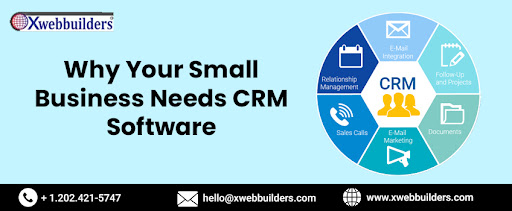
September 01, 2025

A CRM software by a CRM Software Development Company in Ashburn VA is computer application software designed to manage a small or large business's relationships with customers. A CRM system can help businesses keep track of customer information such as names, contact information, and historical purchase records. It allows companies to define customer profiles, run targeted campaigns and analyze customer behavior within their database of past transactions or communications. It is basically a customer relationship management system or a contact management system (CMS) software.
The CRM solutions provided by our CRM Software Development agency in Ashburn VA are used by companies of all sizes, but basically it is a boon for all small businesses in order to improve overall sales and reduce costs. In this article, we will discuss in detail about why small businesses need effective CRM software.
1) Enhances Business Growth: CRM by our CRM Software Development services in Ashburn VA helps in improving sales and reducing your costs. CRM tools is a great tool for small and large businesses to gain more customers and reduce their customer acquisition costs. Small businesses oftentimes don't have enough time or resources to manage all the interaction with their customers so they usually outsource it to a specialized company (CRM software services) to help them run more effective campaigns that help in attracting new customers.
2) Improves Customer Relationship: CRM can be used in order to ensure that your business grows and gets your customers better service. You can easily access your company's data and manage customer relationships the best way possible. With a CRM system, it makes things easier for you to manage customer relations by sending out customized offers and deals. The CRM system also helps in increasing sales by providing a more efficient way in which to offer and promote services.
3) Offers Customer Support: Customer support is often one of the most crucial parts of any business. For example, if you have an account with a particular account and cannot get in touch with your sales person or service representative, what would happen? You may leave the company or decide not to sign up to their services at all.
4) Improves Employee Efficiency: You can use the CRM software by our CRM Software Development company for improving the productivity of your team. They can get data from the CRM software to improve performance and boost their sales strategies.
5) Bolsters the Company's Credibility: By promoting more effective customer relations, you can gain more credibility in the market. Your customers will now have trust in your company and will take your services more seriously.
6) Helps in Sharing Data: CRM software development helps to share data between different companies or you can share data with other offices within your company. You can gather different information from all the users of your CRM software system and then analyze it in order to create reports and analytics for future use or planning purposes.
7) Helps in Accessing Metrics: CRM helps to create reports such as market share and profitability. Accessing the data and analyzing it will help you in knowing more about your customers and how you can improve your company's reputation for better sales.
8) Helps in Planning: The CRM software will be able to help you plan all the strategies that your business has going on in order to market more effectively. You can use this software to gather information such as market research, advertising, pricing, and marketing strategy among other things.
A Customer Relationship Management (CRM) system offers a wide range of functions and capabilities to help businesses effectively manage and optimize their customer relationships. Here are some key functions of a CRM:
1) Contact and Lead Management: CRM serves as a central repository for storing and organizing customer contact information, including names, addresses, phone numbers, and email addresses. It allows businesses to track and manage leads, assign them to sales representatives, and monitor their progress through the sales pipeline.
2) Sales and Opportunity Management: CRM provides tools to track and manage sales activities and opportunities. It enables sales teams to track deals, record sales activities, forecast revenue, and analyze sales performance. This helps businesses prioritize leads, identify bottlenecks in the sales process, and make data-driven decisions to optimize sales performance.
3) Customer Service and Support: CRM facilitates efficient customer service and support by providing a unified view of customer interactions and support tickets. It allows businesses to track and manage customer inquiries, complaints, and requests, ensuring timely resolution and personalized support. CRM also enables customer service agents to access customer history and preferences, enhancing the quality and efficiency of support interactions.
4) Marketing Automation and Campaign Management: CRM integrates with marketing automation tools to streamline marketing campaigns. It enables businesses to manage and segment customer data, create targeted marketing campaigns, track campaign performance, and measure marketing ROI. CRM also facilitates lead nurturing, customer segmentation, and personalized messaging to enhance marketing effectiveness.
5) Reporting and Analytics: CRM provides robust reporting and analytics capabilities to gain insights into customer behavior, sales performance, and marketing campaigns. It generates reports, dashboards, and visualizations to track key performance indicators, identify trends, and make informed business decisions. CRM analytics help businesses understand customer preferences, optimize sales strategies, and refine marketing campaigns for better results.
6) Workflow Automation: CRM automates manual and repetitive tasks, streamlining business processes and increasing efficiency. It allows businesses to automate lead assignment, task notifications, email follow-ups, and other routine activities. Workflow automation saves time, reduces errors, and ensures consistent and timely execution of tasks across the organization.
7) Collaboration and Communication: CRM promotes collaboration and communication among team members. It provides a centralized platform for sharing customer information, recording notes and interactions, and collaborating on deals and projects. CRM enhances team coordination, ensures everyone is on the same page, and improves overall productivity.
8) Integration and Scalability: CRM integrates with other business systems and applications to streamline data flow and eliminate data silos. It can integrate with email clients, calendar applications, marketing automation tools, e-commerce platforms, and more. Additionally, CRM systems are scalable, allowing businesses to accommodate their growing needs as they expand their customer base and operations.
9) Mobile Accessibility: Many CRM systems offer mobile applications or responsive web interfaces, enabling users to access and manage customer data on the go. Mobile accessibility allows sales representatives and customer service agents to stay connected and access critical information anytime, anywhere, improving productivity and responsiveness.
10) Security and Data Privacy: CRM systems prioritize data security and privacy. They implement measures such as role-based access control, data encryption, and regular data backups to protect customer information. CRM also helps businesses comply with data protection regulations, such as GDPR and CCPA, by enabling the management of customer consent and preferences.
After reading this article, we hope that you have a better understanding of why your small business needs CRM software. Now, you can easily invest in the best CRM system to boost your sales and reduce costs. In case you need any further assistance in building your CRM, then feel free to contact Xwebbuilders.com for top notch CRM software development services at affordable rates.